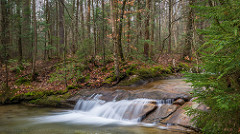I.
A whooshing passed over us—
and perched on a branch—something
see-sawed in the bright dark air,
sailed the clearing sharp-
eyed through pole pine sapling,
beech, maple and hemlock
Blake says are threatened beyond saving:
“Once we were too far north to worry
about infestations but now we must,
I guess. Earth’s breath is fast as hyper-
ventilation, and no one—
not even scientists—knows why
or what will come.”
I tell him spirits we walk among
steal glasses (last week mine
whisked off and weirdly
found soon after in New York),
or frizzle our lines
until they squiggle
and we wonder what we’ve made
or if it can be fixed.
II.
Yesterday, I watched an ant hauling
a burden across the drive before me.
It dropped the object
to trek in ever-widening circles,
coming back to resume the task
once it had found the way all clear.
The ant built small piles of spruce
needles to camouflage its find which,
when I went to look, was a spider
too big for the anthill’s opening.
That had to be dug out.
I showed Blake when he stopped,
who carried with him
two books on animal symbols, the ant
being patience and the spider creativity
(though maybe not a dead spider).
Later I found beside the entrance
the ant excavated for hours
a little mound of dirt and both
ant and spider crushed by a car.
Today: no trace that they had been.
III.
Blake will not speak of ghosts.
He’ll talk of animals, trees, weather
and angels but only briefly.
Spirits are not the same
as ghosts and angels of course
are very rare, didn’t I know that?
He has to go.
At night, down the alley of trees
the low-reaching, feather-like boughs
suture the air as we draw
the efflorescence from this wound
on which the world’s stretched
before us teal and oily like a sea.
Cynthia Hogue has published seven collections of poetry, most recently The Incognito Body, Or Consequence, and When the Water Came: Evacuees of Hurricane Katrina (co-authored with photographer Rebecca Ross).
Click here to purchase Issue 03



